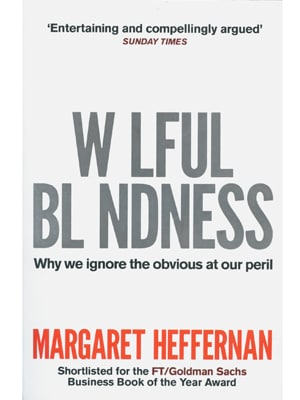
Book Review: Wilful Blindness
Margaret Heffernan’s book uses psychology, history, business and the neurosciences to help you look at your world
If two words could suffice for a review, then this is what it would be. BUY IT!
But because you need a few compelling reasons rather than just a reviewer’s word for it, here are a few.
To start with, sit back for a moment and think of that really intelligent person you know, the one who’s married to somebody you reckon isn’t right for reasons that are obvious to you and everybody else. Except, of course, that ‘intelligent’ person. You probably dismiss this puzzling phenomenon with a tired cliché: Love is blind. Unless, that is, you are Margaret Heffernan.
In the first half of the book Heffernan reaches deep into her own psyche, and attempts to answer a very personal question. She had married a man who died young, at 38. “Was I wilfully blind when I married Michael? Of course, I was. I knew about his heart condition—everybody did.” With the meticulousness of a scientist, but with compassion, tenderness—unexpected in someone trained to look at other humans through clinical eyes—and humanness that comes to one who’s experienced deep pain, she explores her reasons. And in doing so, leaves you with little else but to think hard of the choices you make.
“Not knowing, that’s fine. Ignorance is easy. Knowing can be hard. But at least it is real, it is the truth. The worst is when you don’t want to know—because then it must be something very bad. Otherwise you wouldn’t have so much difficulty knowing.” Heffernan’s gaze prods you powerfully into looking at yourself, individuals around you, interpersonal relationships, organisations of all kinds and the mistakes they make with lenses you’d never imagined existed. She does so through the lenses of psychology, history, business, and the neurosciences.
There is a lot of writing at the intersections out there; many works that attempt to marry different disciplines in the quest to understand our world better.
But where she scores over the others is that most of the literature doing the rounds right now lacks two things: Compassion and cohesion. Wilful Blindness has both, in abundance.
So, is this a book on how to be a better person; or run businesses smarter? Let’s put it this way: The publisher calls it Popular Psychology, but there’s a bit of everything in it and a primer on what you can do to see better. And this part includes some very interesting observations on why Indian business people are more astute than their global counterparts. Tata, the author discovered, travels on the front seat of his car as opposed to the back like most people do. In turn, that makes conversations with his driver easier, which most affluent people shirk away from. The upside—it allows him to “constantly interrogate everything you see. Because the one thing you know is that you cannot control what will happen.”
Wilful Blindness
Margaret Heffernan
Simon & Schuster,
Pages: 391
Price: Rs. 399
(This story appears in the 30 November, -0001 issue of Forbes India. To visit our Archives, click here.)





